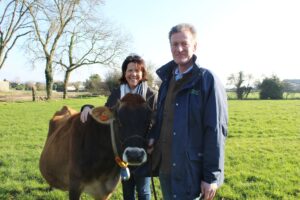JERSEY’S Environment Department is asking Islanders to help protect local amphibians now that the breeding season has started.
In recent years, as the global trade in pond plants and animals has increased, so have a number of non-native ‘invasive’ species in the wild. These may be plants, animals, pathogens (bacteria, virus, or other micro-organism that can cause disease) or other organisms.
Non-native ‘invasive’ species are a real risk to local biodiversity and on the increase in Jersey. If people move frog or toad spawn or tadpoles to other ponds they increase the risk that any non-native invasive plant or animal species will also travel to the new pond and could do real harm to frogs, toads and other pond-inhabitants.
It is also illegal under the Conservation of Wildlife (Jersey) Law 2000 to move or disturb the animals, spawn, or their home.
One big culprit and a real worry to the department is the New Zealand pygmy weed (or Australian swamp stonecrop) an extremely invasive aquatic plant that forms dense carpets, stops sunlight reaching other plants and takes over the pond. Other plants giving cause for concern are Parrot’s Feather, Floating Pennywort and Water Fern.
Moving spawn or tadpoles can also spread disease and are a potential risk to Jersey’s amphibians, including Chytridiomycosis (or Chytrid fungus – a lethal fungal infection) and ranavirus which can cause mass mortality and has caused the extinction of a number of species worldwide.
Aother cause of damage can be when people abandon animals where they shouldn’t. Natural Environment Officers from the Environment Department recently found goldfish in one of the few Island ponds used by our native agile frog for breeding. It was a seasonal pond and when it dried up, the fish would have died of exposure.
Te Environment Department’s Natural Environment Officer, Tim Liddiard, said: ‘We’d really like people’s help in our efforts to protect local wildlife. First,, we should leave our wildlife where it is and let nature do the rest. There is no such thing as too much spawn! Spawn is produced in large quantities because the mortality rate is very high.
‘We’d also like to raise awareness around the good environmental practice of not introducing potentially invasive species into our countryside. For example, please don’t bring plants or seeds back from other countries which may escape the confines of the garden. Serious long term ecological implications can be caused by accidently introducing invasive species into the wider environment and this can be alleviated by following recommended waste disposal regulations.’
It’s not just Jersey suffering from this problem, and it’s not a new problem; almost every ecosystem in the world is affected by non-native invasive species which have spread outside their natural habitats. They’re considered to be one of the greatest threats to biodiversity.
*To find out more about invasive species visit www.nonnativespecies.org The Non-native Species Secretariat (NNSS) has responsibility for helping to coordinate the approach to invasive non-native species in Great Britain.




